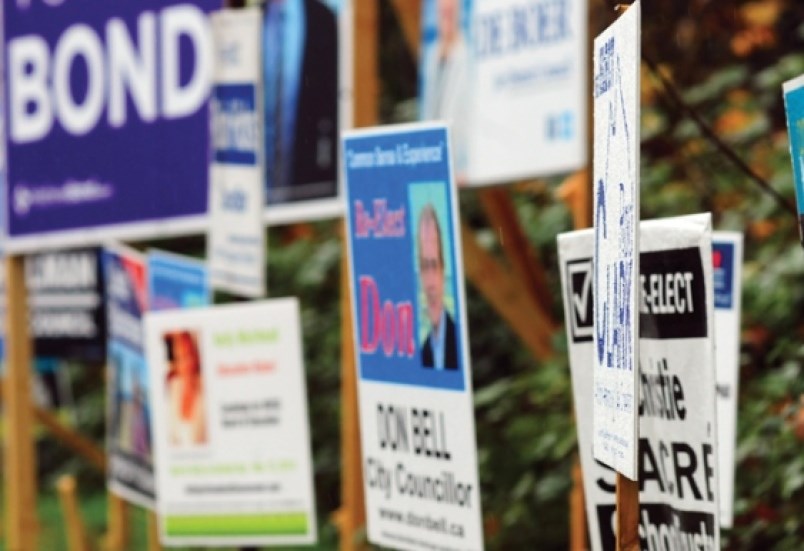Candidates in the upcoming October civic elections on the North Shore will be running leaner election campaigns this time around and getting by with fewer glossy pamphlets and paid helpers.
Elections B.C. released dollar figures for new expense limits for municipal campaigns this week, which set out the maximum amount candidates can spend in an effort to get themselves elected.
The expense limits, brought in under the last provincial government, will be felt most acutely in the City of North Vancouver, where the two mayoralty candidates both spent vastly more than will be allowed under the new rules in the 2014 civic election.
The new expense limits are based on population, so vary between municipalities.
In the City of North Vancouver, candidates running for mayor will now be limited to spending $36,348 – about one-third of the approximately $96,700 spent by Mayor Darrell Mussatto in the last campaign and half the $79,200 spent by challenger Kerry Morris.
Council candidates will also have to make do with the beer-budget version of campaigning, with a spending limit of $18,368.
Both Coun. Linda Buchanan – who spent about $27,600 on her campaign – and Coun. Craig Keating – who spent $28,900 – spent over that limit in the previous election.
More significantly, however, this will be the first civic election since the new provincial government banned union and corporate donations and limited individuals to donations of $1,200.
During the last election, Mussatto, Keating and Buchanan all received sizable donations from a number of real estate developers, businesses and from unions including CUPE, which represents workers at North Vancouver city hall.
Individual donations are also limited to $1,200 under the new rules and can only be made by people who are B.C. residents and Canadian citizens or permanent residents. Candidates will also not be allowed to spend more than $2,400 of their own money on their election campaign.
During the last election, Mussatto received individual donations that were several times that size from the heads of two development companies, while Morris spent more than $70,000 of his own money on his campaign.
Spending and donation limits will be less of a factor elsewhere on the North Shore, but candidates in the districts of North and West Vancouver will also have to keep their campaign belts tightened.
Spending limits for District of North Vancouver mayoralty candidates is set at just under $53,963 while campaign spending by those vying for council seats will be about $27,335. Coun. Jim Hanson spent over that last time – about $28,300 – although the other candidates would have had no problem complying with the new limits.
In the District of West Vancouver, spending on a mayoralty election campaign has been capped at $30,841 while council candidates are limited to spending $15,564. Coun. Mary-Ann Booth spent more than that – about $22,300 – on her council campaign last time, as did the late councillor Michael Lewis, who spent $15,800.
Any candidate planning to skirt the regulations by having someone else pick up the tab will have to think again too: there are also new limits on what can be spent by third parties on advertising that endorses or promotes election candidates. Limits are $1,817 in the City of North Vancouver, $1,542 in the District of West Vancouver and $2,698 in the District of West Vancouver.
The campaign spending limits apply to the period Sept. 22 to Oct. 20. They also include goods and services purchased prior to that but used during the campaign.
In previous civic elections, there were no limits on how much money organizations could donate to a candidate’s campaign or how much candidates could spend, earning B.C. a Wild West reputation and leading to criticisms that those with deep pockets were having an undue influence on some councils.



